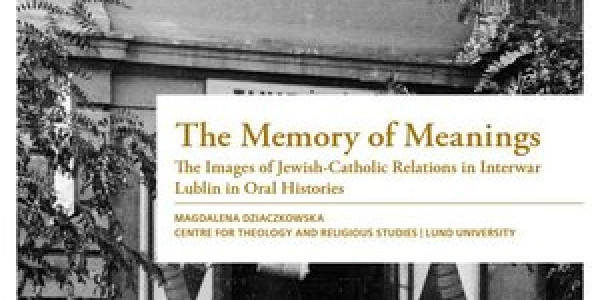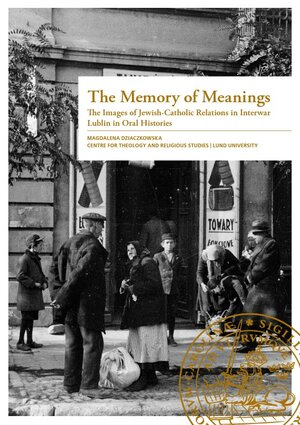The Memory of Meanings. The Images of Jewish-Catholic Relations in Interwar Lublin in Oral Histories
01/06/2023 | Na stronie od 28/06/2023

The Memory of Meanings
Magdalena Dziaczkowska /member of the Polish Council of Christians and Jews/
The Memory of Meanings. The Images of Jewish-Catholic Relations in Interwar Lublin in Oral Histories
2023 | 489 p. | English
ISBN: 978-91-89415-68-3, 978-91-89415-67-6
DOCTORAL DISSERTATION
by due permission of the Faculty of Humanities and Theology, Lund University, Sweden.
To be defended at LUX, Helgonavägen 3, C121 and over Zoom on June 1, 2023 at 14:15 PM
Abstract
This work explores narratives of Jewish-Catholic relations in interwar Lublin, as recalled by its Jewish and Catholic inhabitants by the end of their lives. Thus, it concerns both memory and intergroup relations and seeks to understand the attitudes towards the religious Other.
The main body of sources for this qualitative study is a collection of oral histories from the Grodzka Gate – NN Theatre Centre in Lublin, which were analyzed thematically focusing on the memory of everyday interactions between Jews and Catholics. Particular attention is paid to the link between memory and identity.
The analysis of the narratives draws extensively from theories regarding intergroup contact (Gordon Allport’s intergroup contact theory later developed by i.a. Linda R. Tropp and Thomas Pettigrew), the relation between personal agency versus social structures (Margaret Archer’s morphogenetic sequence), as well as the theory of communication based on context (Dorota Kuncewicz et al.). The latter, combined with an adaptation of Erwin Panoffsky’s iconology, provides an insight into the meaning of the stories – how the religious Other is perceived, why it could be so, and what consequences it has on intergroup relations decades after the recalled events took place.
The findings are grouped into two analytical parts of the dissertation: one dedicated to identity, and another concentrating on relations, which are described on three levels – spatial, interpersonal and interreligious.
On the one hand, the study indicates sensitive points in intergroup relations such as the role of social class and gender relations, which can be used to strengthen existing intergroup separation. On the other hand, it points to instances of overcoming separation and segregation through affective ties, especially of friendship, common socio-economic background, education and personal values.
It points to (inter)religious literacy fortifying prejudice. The main finding, however, is the fundamental difference in perceiving the same past by the minority and the majority group, which has dire consequences for the relationship between these two groups until today.
The study suggests the need for further research on how this memory gap can be addressed to find constructive ways of producing inclusive collective memory in both groups, recognizing the experience of the Other.
